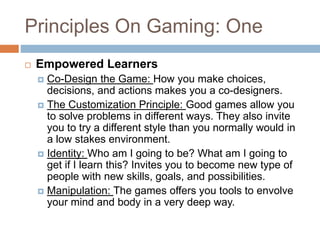Ims presentation
- 1. VIDEO GAMING: EHANCING BRAIN DEVELOPMENT Caroline Christensen IMS 211: Summer 2014
- 2. Overview ïĻ Discuss âPrinciples on Gamingâ ïĻ Methods of Learning Enhanced by Gaming ïĻ Conclusion ïĻ Questions & Discussion
- 3. Project Description ïĻ Objective ïĪ To prove that video gaming enhances brain development in opposition to the common myths that video gaming kills brain cells. ïĻ Key Learning Methods Discussed ïĪ Creativity Enhancement ïĪ Manual Dexterity ïĪ Visual and Spatial Memory
- 4. Principles On Gaming: One ïĻ Empowered Learners ïĪ Co-Design the Game: How you make choices, decisions, and actions makes you a co-designers. ïĪ The Customization Principle: Good games allow you to solve problems in different ways. They also invite you to try a different style than you normally would in a low stakes environment. ïĪ Identity: Who am I going to be? What am I going to get if I learn this? Invites you to become new type of people with new skills, goals, and possibilities. ïĪ Manipulation: The games offers you tools to envolve your mind and body in a very deep way.
- 5. Principles On Gaming: Two ïĻ Problem Based Learning: ïĪ Games are just interesting problem spaces. Gamers are given good tools, given a lot of feedback, and good problem solving with a win state. ïĪ Well-Ordered Problems: Each level is meant to teach to the player to solve a problem that will lead to better solutions at harder levels. Early problems set the player up for later success (level design). ïĪ Pleasantly Frustration: Problem leads to good learning when you feel a challenge yet you know that if you but effort in, you can find a solution. Regime of Confidence. ïĪ The Cycle of Expertise: 1- Routine Problem. 2- Give a new challenge where the routine does not work anymore and they have to alter it until it becomes then routine. ïĪ Information: Language is effective when it is given just in time or it is given on demand. Gamers can apply information immediately or when they need/want to learn it. ïĪ The Fish Tank Principle: Put in information slowly to allow the players to understanding the full array of complexity. ïĪ Sandbox: You are out in the world playing a game but you are protected. Have time to explore before they have to level up. Need the time to play in the sandbox. People can explore at their own pace. Low risk. ïĪ Skills as Strategies: Have to practice the same skills over again. Put the goals under a goal or strategy that can be applied. Have a reason to use the skills you learn right away.
- 6. Principles On Gaming: Three ïĻ Deep Understanding: ïĪ System Thinking: ïŪ Building a model in your head of how things interact. ïĪ Meaning as Action: ïŪ People understand words when they can associate it with a goal, action, or experience. Itâs the actions that you are experiencing in the game that give them meaning. ïĪ Model Based Reasoning: ïŪ The foundation of scientific reasoning.
- 7. Creativity Development ïĻ Children who play video games tend to be more creative. ïĻ Researchers found that both boys and girls who played games â violent or otherwise â tended to flex more creative muscles than their non-gaming counterparts. ïĻ A study of nearly 500 12-year-olds found that the more kids played video games, the more creative they were in tasks such as drawing pictures and writing stories. In contrast, use of cell phones, the Internet and computers (other than for video games) was unrelated to creativity, the study found. - See more at: http://msutoday.msu.edu/news/2011/video-game- playing-tied-to-creativity/#sthash.WJYaapvb.dpuf
- 8. Manual Dexterity Enhancement ïĻ By playing video games, studies show that there is a significant improvement in manual dexterity. ïĻ A second study of 303 laparoscopic surgeons (82 percent men; 18 percent women) also showed that surgeons who played video games requiring spatial skills and hand dexterity and then performed a drill testing these skills were significantly faster at their first attempt and across all 10 trials than the surgeons who did not the play video games first. http://www.apa.org/news/press/releases/2008/08/ video-games.aspx
- 9. Visual and Spatial Memory ïĻ The cover of Nature this month features study suggesting that video games may improve brain function in certain measurable ways. ïĻ The gam The study had 46 participants, aged 60-85, engage in 12 hours of the training over the course of a month. ïĻ ââĶit turned out that the participants whoâd been trained with NeuroRacer and then took tests challenging their attention and working memory did significantly better than the control group. These kinds of cognitive capacities are known to decrease with age, so the fact that they were apparently boosted after the game training is important.â ïĻ http://www.forbes.com/sites/alicegwalton/2013/09/05/can- video-games-actually-improve-brain-and-cognitive-function/
- 10. Conclusion ïĻ Clearly there are many beneficial factors that lead to learning from playing video games. These are only a few. Hope you enjoyed! ïĻ Flip to the next slide for discussion questions!
- 11. Questions and Discussion: ïĻ Talk about games that you have played that you believe have enhanced any of the learning methods discussed. ïĻ What games? ïĻ What learning methods? ïĻ What other learning techniques and cognitive development could be enhanced by playing video games? ïĻ How could these learning methods be implemented in schools today? ïĻ Have you heard of any interesting studies related to the topic?











